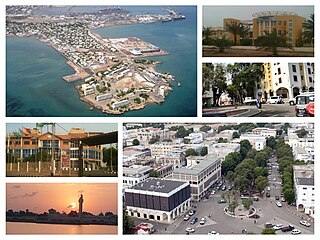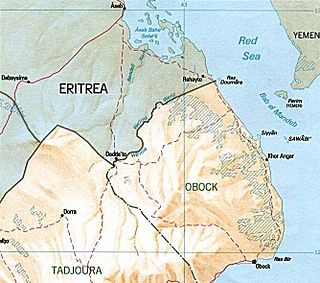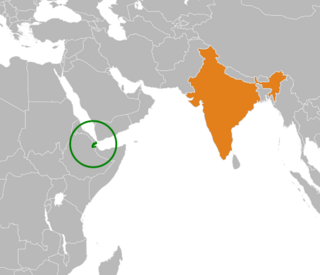Related Research Articles
Djibouti is a country in the Horn of Africa. It is bordered by Somalia to the southeast, Eritrea and the Red Sea to the north and northeast, Ethiopia to the west and south, and the Gulf of Aden to the east.

The economy of Djibouti is derived in large part from its strategic location on the Red Sea. Djibouti is mostly barren, with little development in the agricultural and industrial sectors. The country has a harsh climate, a largely unskilled labour force, and limited natural resources. The country's most important economic asset is its strategic location connecting the Red Sea and the Gulf of Aden. As such, Djibouti's economy is commanded by the services sector, providing services as both a transit port for the region and as an international transshipment and refueling centre.

The Gulf of Aden is a deepwater gulf between Yemen to the north, the Arabian Sea to the east, Djibouti to the west, and the Guardafui Channel, Socotra (Yemen), and Somaliland to the south. In the northwest, it connects with the Red Sea through the Bab-el-Mandeb strait, and it connects with the Arabian Sea to the east. To the west, it narrows into the Gulf of Tadjoura in Djibouti.

The culture of the Republic of Djibouti is diverse, due to the nation's Red Sea location at a crossroads of trade and commerce.

Djibouti City is the eponymous capital and largest city of Djibouti. It is located in the coastal Djibouti Region on the Gulf of Tadjoura.

The Djibouti national football team, nicknamed the Riverains de la Mer Rouge, is the national football team of Djibouti. It is controlled by the Djiboutian Football Federation, and is a member of the Confederation of African Football (CAF) and the Union of Arab Football Associations (UAFA). Until its 1–0 defeat of Somalia's national squad in the opening stage of the 2010 FIFA World Cup qualification, the Djibouti national football team had never won a full FIFA sanctioned international.

The Intergovernmental Authority on Development (IGAD) is an eight-country trade bloc in Africa. It includes governments from the Horn of Africa, Nile Valley and the African Great Lakes. Its headquarters are in Djibouti City.
The individual member states of the African Union (AU) coordinate foreign policy through this agency, in addition to conducting their own international relations on a state-by-state basis. The AU represents the interests of African peoples at large in intergovernmental organizations (IGO's); for instance, it is a permanent observer at the United Nations' General Assembly.

The Djiboutian Football Federation is the governing body of association football in Djibouti. It was founded in 1979, and affiliated to FIFA and the Confederation of African Football (CAF) in 1994, and has been a member of the Union of Arab Football Associations (UAFA) since 1998. The Federation oversees the Djibouti Premier League and the national team.
The Union of Djibouti Workers (UDT) is a trade union centre in Djibouti. It was founded in 1992, and is affiliated with the International Trade Union Confederation (ITUC).

Djibouti, Jibuti, officially the Republic of Djibouti, is a country located in the Horn of Africa. It is bordered by Somalia in the south, Ethiopia in the southwest, Eritrea in the north, and the Red Sea and the Gulf of Aden in the east. Across the Gulf of Aden is Yemen. The country has a total area of 23,200 km2 (8,958 sq mi). The Republic of Djibouti is predominantly inhabited by two ethnic groups, the Somali and the Afar people, with the former comprising the majority of the population.

The Djiboutian–Eritrean border conflict between the forces of Djibouti and Eritrea occurred between June 10 and June 13, 2008. It was triggered by tension which began on April 16, 2008, when Djibouti reported that Eritrean armed forces had penetrated into Djibouti and dug trenches on both sides of the border. The crisis deepened when armed clashes broke out between the two armed forces in the border area on June 10, 2008. During the conflict, France provided logistical, medical and intelligence support to Djibouti, but did not participate in direct combat.

Foreign relations of Djibouti are managed by the Djiboutian Ministry of Foreign Affairs and International Cooperation. Djibouti maintains close ties with the governments of Somalia, Ethiopia, France and the United States. It is likewise an active participant in African Union, United Nations, Non-Aligned Movement, Organisation of Islamic Cooperation and Arab League affairs. Since the 2000s, Djiboutian authorities have also strengthened relations with Turkey and China.

Djibouti–Kenya relations are bilateral relations between Djibouti and Kenya.

Djibouti–India relations are bilateral relations between Djibouti and India.

Djibouti–Spain relations are the bilateral and diplomatic relations between these two countries. Djibouti does not have embassy in Spain but his embassy in Paris is accredited to this country. Spain also has no embassy in Djibouti, but its embassy in Addis Ababa, Ethiopia is accredited to this country.

Djibouti–Turkey relations are the foreign relations between Djibouti and Turkey. Currently, Turkey has an embassy in Djibouti since 1977, while Djibouti has an embassy in Ankara since 2013. Both countries officially established diplomatic relations on 1977.
References
- ICTUR; et al., eds. (2005). Trade Unions of the World (6th ed.). London, UK: John Harper Publishing. ISBN 0-9543811-5-7.
| This Djibouti-related article is a stub. You can help Wikipedia by expanding it. |
| This article related to an African trade union is a stub. You can help Wikipedia by expanding it. |